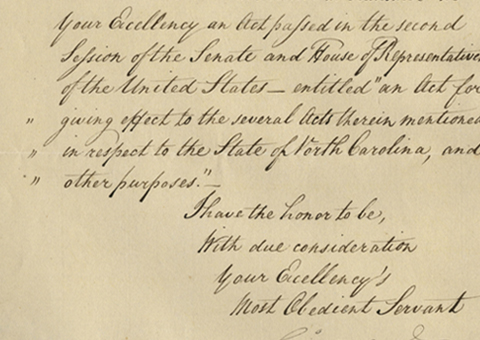SOLD North Summons Members to Parliament That Would Force His Resignation & Accept American Independ

The news of the surrender of Cornwallis arrived in London at the end of November 1781. It was an unexpected blow that shook the Prime Minister, Lord North, who when informed exclaimed, "Oh God, it’s all over!" Not two weeks passed before motions were introduced into the House of Commons against continuation...
The news of the surrender of Cornwallis arrived in London at the end of November 1781. It was an unexpected blow that shook the Prime Minister, Lord North, who when informed exclaimed, "Oh God, it’s all over!" Not two weeks passed before motions were introduced into the House of Commons against continuation of the American War. The votes on military budget estimates that North needed to get through Parliament showed dimished support for his government, and to regain momentum North spoke implying that further offensive measures in America were not under consideration. In this atmosphere, on December 20, North carried a motion to adjourn the House of Commons. Along with that adjournment, there was a Call of the House for Parliament to reassemble on January 21, 1782. Pursuant to that Call, the Speaker ordered that those officials whose job it was to officially serve notice on the members that their attendance at the next session was required, should do so. In addition to being prime minister, North was Lord Warden of the Cinque Ports of Hastings, New Romney, Hythe, Dover, and Sandwich, a ceremonial post later held by Winston Churchill. As such, it was his task to summons members representing those constituencies. Thus, by pure coincidence, North would be in the anomalous position of being obligated to summon members to a Parliament that would demand his ouster.
The day after adjournment, North fulfilled the requirements by sending out the necessary “Summons to Parliament” letters calling Cinque Port members to its next session. This is one of those five communications.
Letter Signed as Prime Minister, Downing Street, London, December 21, 1781, to an official either in the Warden’s office or in Sandwich itself, informing him that, “In obedience to an order of the House of Commons, I desire you to summon the members of Parliament representing Sandwich to attend their service in Parliament on Monday the twenty first day of January next. You will be pleased to give me an account of the receipt of this letter & what you have done thereon.” North was likely comfortable in sending this particular letter, as both of the members for Sandwich were reliable supporters of his ministry. Philip Stephens, Secretary to the Board of Admiralty, held one seat, while the other had recently been won by former Undersecretary of State Sir Richard Sutton, who had displaced an opposition member after a stiff fight.
Parliament reassembled on the 21st of January. That very day, North wrote the King "Peace with America seems necessary," and followed up by submitting his resignation. The King refused it and instead urged continuation of the American War. The opposition in Parliament, led by Charles James Fox, wasted no time in turning up the heat on the North government. From February until mid-March, the North ministry was contested on six major votes. On 7 and 26 of February, Fox led censure motions against Sandwich; both were defeated. On the 22nd, Henry Conway, a former minister in the Chatham administration, led an address to the throne to end the American war and cede the colonies their independence. It was defeated by only one vote. On the 24th, a reworded resolution to abandon further prosecution of the war against the American colonies passed with nineteen votes to spare. Absentees and defections from within North’s own party strengthened the opposition, which on March 8 was narrowly defeated in its motion of no-confidence against North’s government. The vote on the 20th was even closer. North realized that his government’s end was near. In front of a packed chamber on the 22nd, he rose to be recognized. The opposition had hoped to vote on its no-confidence measure before North could resign. An hour long debate followed before North could be heard. He then resigned before the final vote, saying "those persons who had for some time conducted the public affairs, were no longer his Majesty’s ministers."
The King felt betrayed by what he saw as North’s desertion but nonetheless, reluctantly, appointed Lord Rockingham to succeed him. Rockingham began peace negotiations with the Americans in April 1782, and after his untimely death later that summer, his successor, the Earl of Shelburne, recognized the independence of the United States in November. Our thanks to the Clerk of the Parliamentary Archives, Westminster, London, for his office’s assistence in researching this letter and Parliamentary procedures during the 18th century.

Frame, Display, Preserve
Each frame is custom constructed, using only proper museum archival materials. This includes:The finest frames, tailored to match the document you have chosen. These can period style, antiqued, gilded, wood, etc. Fabric mats, including silk and satin, as well as museum mat board with hand painted bevels. Attachment of the document to the matting to ensure its protection. This "hinging" is done according to archival standards. Protective "glass," or Tru Vue Optium Acrylic glazing, which is shatter resistant, 99% UV protective, and anti-reflective. You benefit from our decades of experience in designing and creating beautiful, compelling, and protective framed historical documents.
Learn more about our Framing Services






































































































